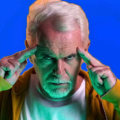Mentalism is a performing art in which its practitioners, known as mentalists, seem to demonstrate highly developed mental or intuitive abilities. The performances may appear to include hypnosis, telepathy, clairlecture, divination, precognition, psychokinesis, mediumship, mind control, feats of memory, deduction, and quick mathematics. Mentalists perform a theatrical act that includes effects that may appear to employ psychic or supernatural forces, but are actually achieved by ordinary means of conjuring, natural human abilities (i.e., reading body language, refined intuition, subliminal communication, emotional intelligence), and an understanding deep understanding of the key principles of human psychology or other behavioral sciences. Mentalism began as a branch of philosophy, led by intellectual leaders such as René Descartes, Baruch Spinoza and Immanuel Kant.
These people wanted to get to the heart of human thought processes and explain the general meaning of thinking through the application of systematic logic. Led by famous mentalists such as John Randall Brown, The Amazing Kreskin, Derren Brown and yes, even the infamous Uri Geller, mentalism has evolved over the years to include various psychological presentations such as mind reading, predicting the future, telepathy, cold reading, hypnosis, the exploits of memory , mind control, telekinesis and more. Since Geller was publicly exposed for using common mentalism tricks, most modern mentalists claim to be psychic artists rather than individuals who possess authentic psychic abilities. Mentalists are experts in the art of nonverbal behavior and, therefore, all of their mentalism tricks involve cognitive manipulation techniques.
In fact, the depth is so buried that some mentalists ridicule the concept of comparing mentalists with magicians. ABSTRACT Mentalists are performers or “psychic” artists who possess highly developed mental or perceptual abilities. However, some mentalists have honed their abilities to a point where their audiences truly believe they possess some kind of psychic powers or otherworldly mental abilities.






